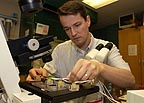June 22, 2006
Grant fuels cancer research at SIUC
CARBONDALE, Ill. -- Genes are one thing, but scientists at Southern Illinois University Carbondale say proteins are where the rubber meets the road in the fight against cancer.
Far more complex than their biological counterparts, proteins do the work assigned to them by DNA, such as telling a cell when and how to reproduce itself. For this reason, many researchers believe protein malfunctions may be at the root of cancer, which involve abnormal cell growth.
Proteins, however, are numerous, complicated and always changing, making isolating and studying them difficult. The current method of doing so is slow — taking 24 hours or more — and gives variable results. That's not a good thing in science, where the goal is to produce reliable, predictable outcomes.
A researcher at SIUC, however, is one of two University scientists who recently won a grant from the National Cancer Institute under the National Institute of Health to develop a new and improved instrument for isolating and studying proteins.
Luke Tolley, assistant professor in the Department of Chemistry and Biochemistry, has invented a device that can conduct "dynamic isoelectric focusing" of protein molecules. Using about $30,000 in seed money provided by the University in 2005, Tolley built a working prototype of the device, which he says is a major improvement over the current method for studying proteins.
"The device does better separation, much faster with results that are more reproducible,"
Tolley said. Simply being able to run more separations faster — his device takes only about 30 minutes to run a separation — will allow scientists to do more valuable research.
Tolley is now working on an improved prototype using the $180,000 provided by the NCI. The University will get another $70,000 for support costs, making the total grant about $250,000 over two years.
The money will pay for several doctoral students and hardware, among other expenses, Tolley said.
The instrument uses varying voltages to isolate proteins suspended in glass tubes no thicker than a human hair. More than 500,000 proteins can occupy such a sample and tiny, incremental differences in voltages make all the difference between success and failure. So far, Tolley has succeeded in isolating about 1,100 proteins, and he believes that number will grow.
If successful, it's possible the instrument will become standard equipment in research labs around the world.
"Everybody is trying to solve this problem," said Tolley, a native of Durham, N.C., who worked in private industry and as a researcher for the U.S. government before coming to SIUC in 2003. "This is better than the current tools. For people doing (this kind of research), it could become a fixture in their labs."
Tolley is working with Cal Meyers, distinguished professor emeritus and founder of the Meyers Institute, on the project. Meyers will use the new instrument to examine prostate cancer cell proteins before and after treatment with anti-cancer compounds, looking for key differences that might lead to improved treatments.
"The goal is to figure out what those differences mean, to cancer research," Tolley said. "That's the next step."
Leading in research, scholarly and creative activities is among the goals of Southern at 150: Building Excellence Through Commitment, the blueprint the University is following as it approaches its 150th anniversary in 2019.

Looking for answers – Luke
Tolley, assistant professor
in the Department of Chemistry
and Biochemistry at Southern
Illinois University Carbondale,
demonstrates how his dynamic
isoelectric focusing instrument
can be used in conjunction
with a microscope. Tolley
and Cal Meyers, distinguished
professor emeritus and founder
of the Meyers Institute at
SIUC, recently received a
$180,000 grant from the
National Cancer Institute
to study the relationship
between proteins and cancer.
Download Photo Here
